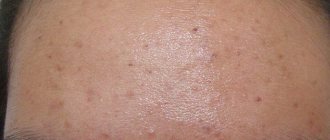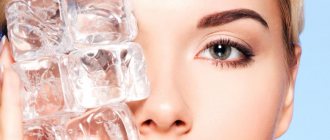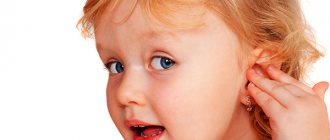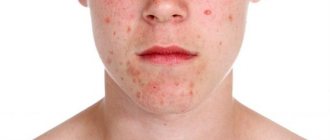What is acne
The content of the article
Acne occurs due to clogged sebaceous glands and excessive sebum production. This fat makes human skin more elastic, protects against drying out of the skin, promotes the process of skin thermoregulation and protects against the penetration of many viruses and infections into the body.
In the case of an increase in androgens (male sex hormones), the secretion of sebaceous secretions increases. The disease most often occurs in young men under twenty years of age. However, it can also appear at a later age due to metabolic disorders.
How to remove acne at home: 4 natural remedies
In addition to cosmetic products designed to combat acne, you can also try alternative products of natural origin.
However, before we move on to listing them, we caution that there has not yet been enough research done to confirm (or refute) their effectiveness.
Tea tree oil
This essential oil, obtained from the leaves of the tea tree (melaleuca), can fight bacteria, which are often the culprits of acne. Thus, according to the results of one study, a 5% tea tree oil gel was six times more effective in reducing the severity of acne compared to a placebo.
Another study also found that a gel containing 5% tea tree oil was as beneficial for fighting acne as the popular acne treatment lotion with 5% benzoyl peroxide.
Although tea tree oil has proven effective in eliminating acne, it should be used with caution, since in concentrated form it can cause symptoms such as dryness, redness, burning, and irritation.
- Travel bag How to get rid of irritation after shaving? 6 ways to forget about this problem forever
To avoid these side effects, be sure to do an allergen test before use. To do this, apply a drop of the product to the bend of your elbow and wait a little. If the skin is not red and you do not experience discomfort, you can use the oil on your face.
However, remember that it cannot be used in its pure form, and always dilute tea tree oil with a cream or carrier oil in the proportion of a drop of oil to a teaspoon of cream or oil.
Dip a cotton swab or swab into the resulting mixture and apply it directly to the pimple. Afterwards, you can apply your usual face cream to the skin. Continue to repeat this procedure a couple of times a day until the condition improves.
Other essential oils
Tea tree isn't the only essential oil known for its antibacterial and anti-inflammatory properties that are beneficial for fighting acne. Other essential oils that have been proven to be effective by research include:
- cinnamon;
- rose;
- lavender;
- carnation;
- rosemary;
- lemongrass;
- orange.
Like tea tree oil, these products should not be applied directly to the skin to avoid irritation and worsening symptoms.
To avoid side effects, perform an allergen test and dilute the selected oil in the proportion: 10 drops to 30 ml of carrier oil. Apply the prepared product directly to problem areas morning and evening on a regular basis until your condition improves.
Green tea
Green tea contains flavonoids and tannins, which are known to help fight inflammation and bacteria, and therefore acne.
In addition, it contains high levels of the antioxidant epigallocatechin-3-gallate (EGCG), which studies have shown reduces sebum production and inhibits the growth of acne-causing bacteria.
Today on the market you can find many cosmetic products that contain green tea extract, but a product based on it can also be prepared at home. What should be done:
- Brew green tea in boiling water for 3-4 minutes.
- Let the drink cool.
- Soak a cotton swab in tea and wipe the problem area with it.
- Wait 10 minutes and then rinse your face with warm water.
Aloe vera
Aloe vera is a powerful and versatile remedy that has been proven effective in fighting bacteria and inflammation in scientific experiments. It is also actively used for various skin diseases from psoriasis to burns.
Although the number of studies examining the effects of aloe vera on acne is still limited, the results of the experiments look promising. Aloe vera contains lupeol, salicylic acid, urea nitrogen, cinnamonic acid, phenols and sulfur, which suppress acne-causing bacteria.
- Travel Case 7 Best Home Remedies for Acne Recommended by Dermatologists This problem affects almost everyone.
Although aloe vera gel alone was not effective in treating acne in existing studies, it did enhance the anti-acne effects of clove-basil oil and tretinoin cream. From this we can conclude that natural aloe vera gel can be a useful addition to your chosen acne-fighting strategy - simply apply it on top of the skin after your main acne treatment.
- Author: Maria Minaeva
Causes of acne in men
The main reason is hormonal changes in the body, nothing can be done about it - nature. But nutrition and personal hygiene are also important factors. Poor diet contributes to the production of toxins in the body, which leads to discharge on the skin, rashes can be located in small areas throughout the body.
If hygiene is insufficient, ulcers will appear in ninety percent of cases, they will spread over a large area, it is important to stop this spread in time.
One of the symptoms of premenstrual syndrome
A woman's life is divided into cycles. Changes in the endometrium, ovulation and menstruation are caused by cyclic hormonal changes. A few days before menstruation, many women experience a range of unpleasant symptoms:
- hardening and tenderness of the mammary glands;
- mood swings;
- bloating;
- headache;
- deterioration of the skin condition - rashes, pimples, inflammation.
In this case, treatment is not required if the rash is isolated. In severe cases, acne treatment is required to maintain the skin's barrier function and improve aesthetics.
How to deal with acne
First of all, you need to visit a dermatologist, but if this is not possible, you can use the tips below.
In the case of nutrition, everything is simple, a properly selected diet is enough, it’s not difficult to create it yourself. You need to give up high consumption of flour, soda and other junk foods.
Hygiene is more difficult. Those areas where acne has appeared must be washed with running water at least 3 times a day, and you will also have to use various ointments and lotions to wipe the affected areas. You should not use regular soap (replace with foam), and do not try to dry the skin with alcohol-containing products or acids (salicylic). Dry, cracked skin makes it easier for bacteria to penetrate.
If acne does not go away by following these rules, then you need to go to the clinic to see a dermatologist and, through laser treatment, say goodbye to this disease once and for all. The laser is effective because it destroys the porphyrin in propionbacteria, therefore killing them.
Drawing conclusions
Adult acne can occur for the following reasons:
- hormonal imbalance, hyperandrogenism;
- heredity;
- diseases of the thyroid gland, adrenal glands;
- premenstrual syndrome;
- unbalanced diet rich in fast carbohydrates;
- stress, insomnia, psycho-emotional stress;
- bad habits;
- improper and insufficient cleansing of the skin.
Skin is a reflection of internal health.
If a person continues to have acne in adulthood, it is worth taking a comprehensive approach to examining the body. Only then can the true cause be found and eliminated. The treatment of dermatological diseases, including acne, should be carried out by a doctor who will draw up an individual treatment plan. August 23, 2020
Author of the article: dermatologist Mak Vladimir Fedorovich
What to do if acne appears
Acne is not as simple as it might seem; you can get it at any age. Of course, there is nothing terrible about it, but you shouldn’t leave everything to the will of fate - it could cost you your natural beauty!
It is necessary to take hormone tests every six months, then there will be no problems with this.
ONLINE REGISTRATION at the DIANA clinic
You can sign up by calling the toll-free phone number 8-800-707-15-60 or filling out the contact form. In this case, we will contact you ourselves.
Genetics
Many skin diseases, such as psoriasis and atopic dermatitis, are genetically determined. Doctors have long noticed that there is a hereditary predisposition to the development of acne. Even during puberty, those children whose parents had similar problems suffer from acne more often. Scientists have found that several genes, including HLA-DRA, are responsible for the development of severe forms of acne.
In this case, the level of testosterone in the blood may be within normal limits, but the skin receptors are too sensitive to androgens, and this feature is due to genetics.
Air
Problems with air exchange often affect the condition of the skin. The main reason lies in low-quality cosmetics. We are talking about shampoo or soap that you use every day. All of them have a rather complex composition, which may include not only mineral additives, but also various chemical elements, which sometimes turn out to be harmful.
In some cases, the problem may be individual, because no two people are alike, and therefore the shampoo that suits your brother may be a bad choice for you.
There is another very simple example - a hat. Since childhood, we have been taught to remove our hats indoors. The whole point here is not only about manners, but about problems that may arise with health.
If you stay in a warm enough room wearing a hat for at least ten minutes, you will notice how your head begins to sweat profusely. This is a reaction to overheating, and the body is simply trying to lower the temperature of an area of the body. In general, areas of heavy sweating are places where men can develop acne.
The effect of daily alcohol consumption on the body
Alcohol-containing products tend to cause cravings, which are very difficult to overcome in the future. The composition contains many harmful impurities that have a detrimental effect on the entire body. Gradually, tissues and cells of almost all systems are destroyed.
Ethyl alcohol, when used systematically, causes both physiological and social damage. The consequences manifest themselves in the form of serious damage to all body systems and the development of chronic diseases.
Physiological changes
When ethanol gets inside, it interacts with nervous tissue: its protection is destroyed. Just 1 liter of beer or a bottle of wine leads to serious consequences - the death of up to 10 thousand brain cells that cannot be restored. This subsequently affects mental activity and general health.
Ethyl alcohol also disrupts the conduction of impulses through nerve cells. For the central nervous system this manifests itself as:
- problems in the emotional sphere;
- the appearance of speech defects;
- disturbances in the functioning of the organs of vision and hearing;
- problems with coordination, etc.
Alcohol has an effect on the cardiovascular system. The tissues of organs are connective tissue, the elasticity of which is lower. This affects the functioning of the heart and blood vessels: problems with blood pressure appear, and there is a violation of the contractile function of the myocardium.
The whole body suffers, there are no exceptions. Ethyl alcohol harms the walls of the stomach, so the risk of ulcer formation is high. There is a change in acidity, which also negatively affects the digestion process.
Frequent dizziness and headaches are also a common consequence of alcoholism.
External signs of a drinking person
The visual manifestations of a drunkard do not immediately become noticeable. Signs begin to develop gradually. With each subsequent stage of development of the disease, the marks on the face of an alcoholic become more and more pronounced. Most of them are reflected in appearance:
- due to improper outflow of bile, the whites of the eyes and skin become yellow;
- the face turns red as blood pressure rapidly rises after drinking alcohol;
- the skin becomes covered with pimples and rashes;
- The area under the eyes suffers - so-called bags are formed, spoiling the appearance.
Dry epidermis and accelerated appearance of wrinkles are also signs of people who drink. Often the face is covered with a thin vascular network.
The nose takes on a burgundy-red hue. Much changes in facial expressions: the muscles of the mouth relax excessively, the forehead tenses. As a result: the face takes on a rather strange expression, as if always slightly surprised.
People who drink lose weight and their skin looks unhealthy. In this case, swelling of the face is characteristic. These are the signs that will help you recognize a drunkard at first sight.
Mental changes
Long-term use of ethanol-containing drinks is fraught with significant mental disorders. There is a high risk of developing alcoholic hallucinosis. Often patients hear voices that insult them, say unpleasant things, and are often threatening in nature.
The most common disorder is delirium, otherwise known as delirium tremens. With hallucinosis there is no impairment of consciousness. The patient continues to navigate in time. In some patients, the disease becomes chronic.
Personality degradation is a fairly common accompaniment of addiction. Intellectual abilities and stress resistance are significantly reduced. The drinker is secretive and taciturn. An ever-increasing dose of alcohol negatively affects the ability to adequately perceive reality. In the morning, the patient does not remember what happened the day before while he was aggressive or unconscious.
Impact on family relationships
An alcohol abuser destroys both his life and his family. Alcoholism is not compatible with family life. For the patient, the environment becomes an obstacle on the path to addiction. The social role of a person is changing dramatically, as is psychology. Close people suffer, as the person becomes weak-willed and aggressive. The wife of an alcoholic and his children have to endure a lot. The drinker stops fulfilling his family responsibilities and brings a lot of trouble to his loved ones. Inappropriate actions, changeability in mood, hostility - this does not have the best effect on relationships between people. The rudeness and irritability of an alcoholic primarily affects those closest to him - his wife and children. The progression of the disease further complicates the situation. This often leads to discord within the family and subsequent divorce.
The well-being of children is at risk. They grow up in an unhealthy environment, which affects their psyche. All the patient's immediate circle suffers from binge drinking. Female alcoholism is no less dangerous. A sick woman is not able to fully perform the functions of a mother. The disease destroys women's nature. Long-term alcohol abuse is fraught with serious changes in the psyche. This is especially dangerous for children and their health.
Psychosis and hysteria become constant companions of an alcoholic. Another problem is codependency. The suffering felt by family members is a direct consequence of the drinker’s actions. The well-being of others deteriorates in proportion to the increase in the dose consumed by the patient. Everyone is stressed: spouse, children.
Diagnostics
To determine the root cause of acne in women aged 30-35 years, laboratory and instrumental tests are carried out:
- visual examination of the skin;
- clinical blood test;
- microbiological analysis of skin scrapings.
If pathologies of internal organs are suspected, ultrasound diagnostics of the pelvic organs and abdominal cavity is prescribed. If serious diseases are detected, the patient consults an endocrinologist, gynecologist, gastroenterologist or other specialists. Based on the results of laboratory tests and hardware examination, the doctor makes a diagnosis.










